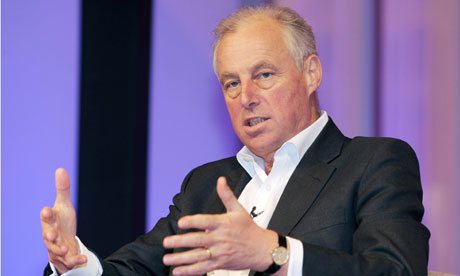Ministers warned over plans to exclude transport emissions
Tim Yeo attacks plans by senior ministers to ensure that shipping and aviation are left out of UK carbon budgets

Tim Yeo has criticised plans by senior ministers to ensure that greenhouse gas emissions from aviation and shipping will not be included in UK carbon budgets. Photograph: Lynn Hilton/Rex Features
The former Conservative cabinet minister, Tim Yeo, has sharply criticised plans by senior ministers to ensure that greenhouse gas emissions from aviation and shipping will not be included in the UK's carbon budgets.
He warned that to leave out these major sources of emissions would contravene the 2008 Climate Change Act, which stipulates emissions cuts of 80% by 2050.
Yeo said this could contribute to dangerous climate change, and that if these transport sectors were left out, other parts of the economy would have to make steeper cuts: "If aviation and shipping emissions are now excluded, the overall target reduction for all other sectors would need to be increased from 80% to around 85%," he said.
Yeo chairs the parliamentary select committee on energy and climate change, which has written to ministers to urge them to include these major forms of transport in the UK's carbon budgets. A decision on whether to include them is expected later this year.
George Osborne, the chancellor of the exchequer, is known to be reluctant to take any measure that could be construed as adding to consumers' bills. He wants to be seen as championing consumers by refusing regulation, and to appeal to the right wing of the Tory party, many of whom are sceptical of green issues. His supporters in government are also understood to have raised concerns with the Department of Transport and the Department of Business, Information and Skills.
Emissions from aviation and shipping have been a heated issue in climate change debates. Aviation alone accounts for close to 3% of global emissions, but because it is difficult to apportion the emissions from international flights to one state or another, governments have tended simply to shelve the issue.
The sectors were left out of the 1997 Kyoto protocol, because rows over how to include them could not be resolved. But this situation is untenable in the long term, argue climate experts, because as international travel and global trade are growing, emissions from the sectors are increasing.
The European Union became the first to attempt to regulate emissions from aviation this year, by including international flights in its emissions trading system. That means airlines must buy carbon permits to cover the emissions generated by all of their planes that take off or land in EU member states.
Airlines protested that this would add to the costs of flights and encourage carriers to avoid Europe. In practice, however, the inclusion adds very little to the cost of flights because the price of carbon permits is so low, at just a few euros per tonne.
Some other countries are unhappy at the regulation. The European commission is embroiled in a dispute with the US and China over the inclusion of flights in the trading scheme. The US Congress has moved to legislate on the issue, in order to forbid US airlines from complying.
In the UK, bringing aviation and shipping into the scope of the carbon budgets would mean that, in future, either emissions from these sectors would have to be brought down, or those of other sectors, such as energy or road transport, would have to be cut even more sharply than planned.
But the Treasury is understood to be concerned that including aviation and shipping in the budgets would raise the price of airline tickets and the cost of goods imported by ship. Green campaigners believe that including the sectors would encourage them to become more efficient.
Yeo said the sectors should be included in the UK's carbon budgets, which set out how much can be emitted over a set period of years. Not including them would ignore a major and growing source of emissions.
He said: "The aim of the Climate Change Act was to demonstrate British leadership in the international effort to avoid a global temperature rise of 2C, widely regarded as a dangerous potential tipping point for the climate. We must not lose sight of the fact that the ultimate cost of failing to keep temperature rises below 2C could be measured in floods, mass migration, economic disruption and chaos."
No hay comentarios:
Publicar un comentario